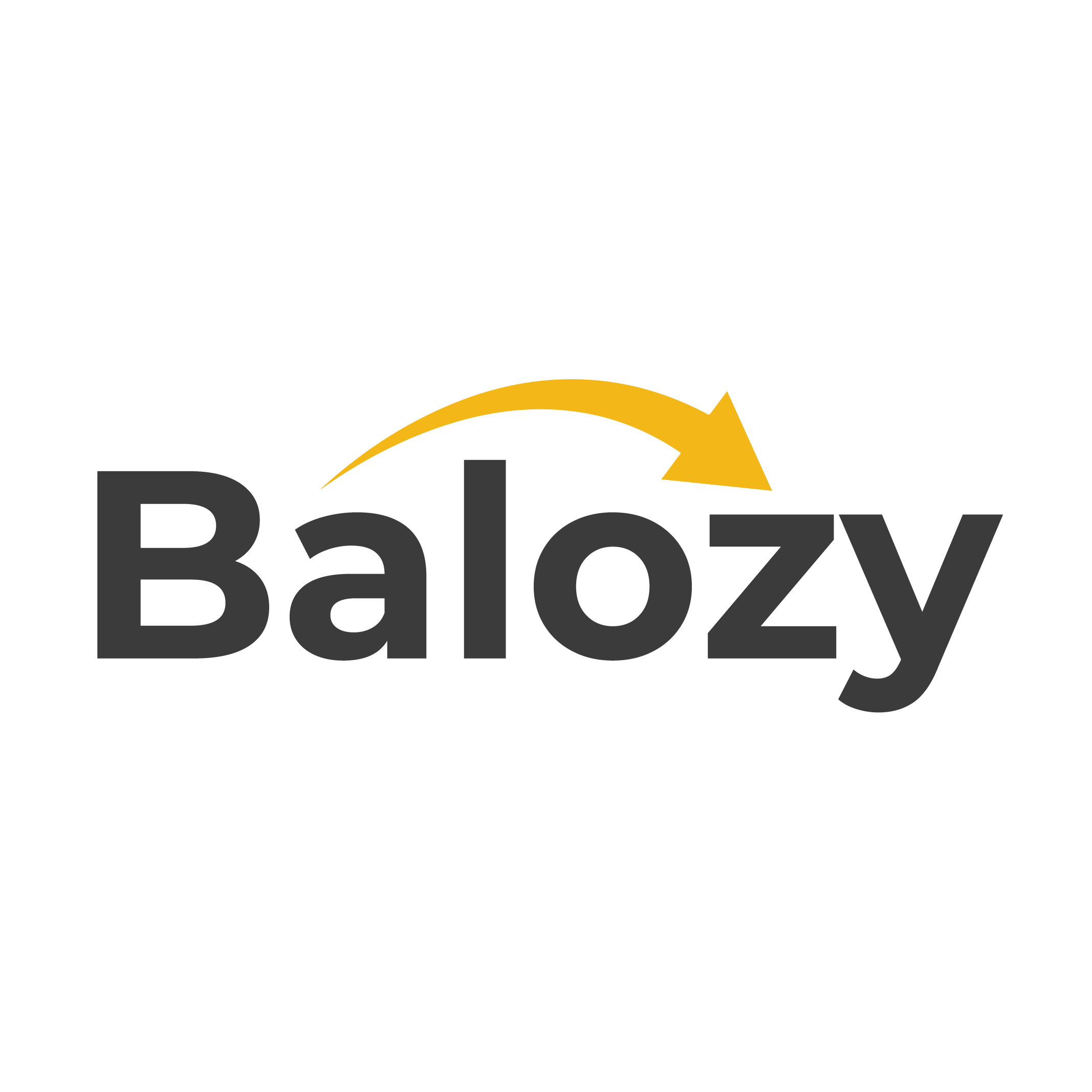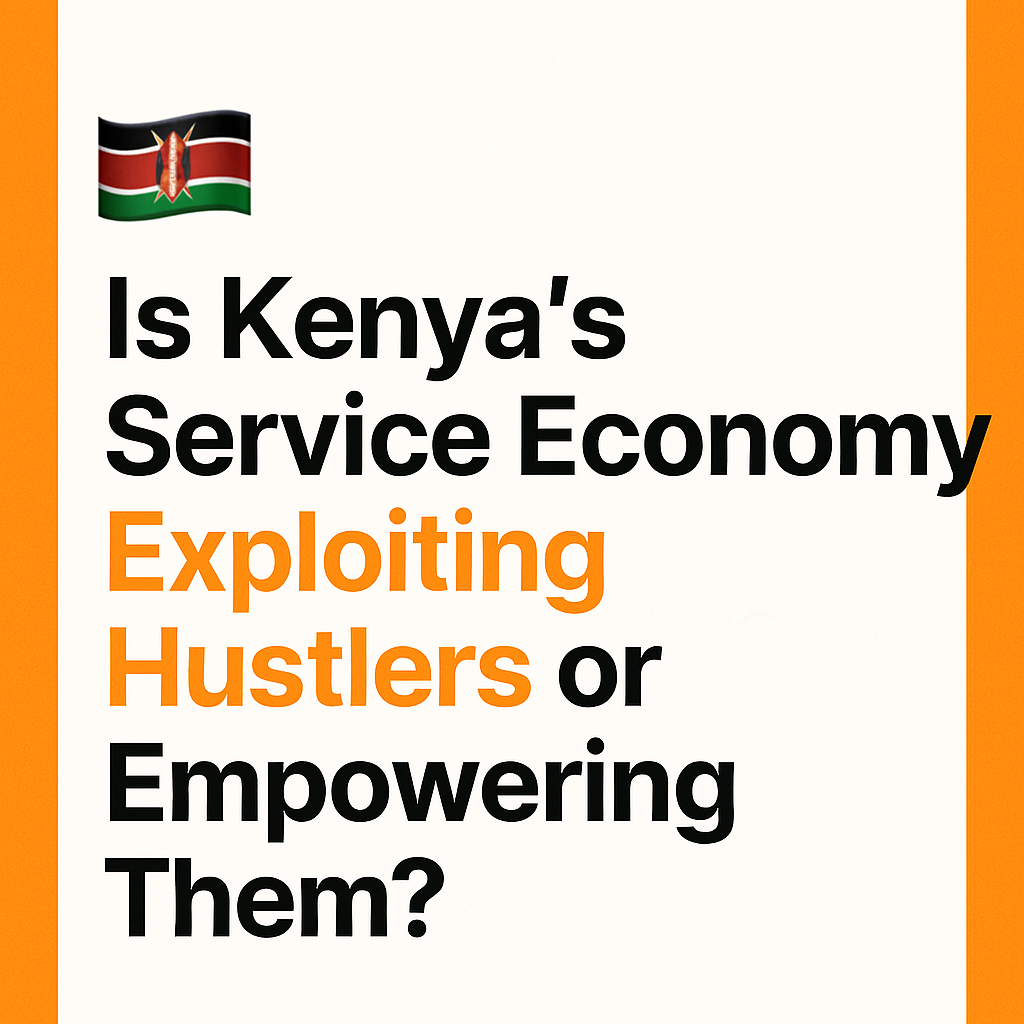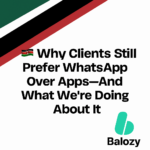In every corner of Kenya—from the bustling estates of Nairobi to the quiet lanes of Eldoret—hustle is the heartbeat of survival. Mama fua, fundis, tutors, bakers, boda riders, and DJs form the backbone of a service economy that’s growing fast, digitizing faster, and redefining what it means to earn with dignity.
But beneath the surface of this vibrant ecosystem lies a question that refuses to go away:
Is Kenya’s service economy truly empowering hustlers—or simply exploiting them?
💼 The Rise of Hustle-as-a-Service
Kenya’s informal sector accounts for over 80% of employment. For many, the path to income isn’t paved with degrees or office desks—it’s built on skill, grit, and mtaa connections. Hustling isn’t just a lifestyle—it’s a survival strategy, a form of resilience, and increasingly, a digital opportunity.
Platforms like Balozy, Taskmoby, and FixChap have emerged to digitize this hustle, offering verified bookings, client reviews, and mobile payments. They promise visibility, trust, and scale. But they also introduce new pressures: algorithmic matching, price competition, and client expectations that often ignore the realities of labor.
⚖️ The Exploitation Argument
Let’s be honest—many hustlers still face systemic disadvantages, even in the digital age:
- ✅Low Pay for High Skill: A fundi who installs a CCTV system or repairs a leaking roof may earn less than a casual laborer, despite years of experience. The market often undervalues technical mastery.
- ✅No Safety Nets: There’s no insurance, no pension, no fallback. If a mama fua gets injured on the job, she’s on her own. The gig economy rarely offers protection.
- ✅Client Bias & Disrespect: Unverified pros often face skepticism, late payments, or outright ghosting. Some clients treat service providers as disposable.
- ✅Platform Pressure: Some apps prioritize speed and ratings over fair compensation, pushing pros to accept jobs below market value just to stay visible.
In this light, digitization can feel like a new form of gatekeeping—where hustlers are ranked, rated, and rushed, but rarely respected.
💪 The Empowerment Perspective
Yet, there’s another side to the story. Verified platforms like Balozy are flipping the script by:
- ✅Offering Trust Badges: Pros who complete onboarding and background checks get verified—instantly boosting client confidence and job access.
- ✅Enabling Direct Bookings: No middlemen, no brokers. Hustlers control their profiles, pricing, and availability.
- ✅Providing Digital Visibility: A mama fua in Machakos can now be discovered by clients in Syokimau, Eldoret, or even abroad.
- ✅Building Community: With WhatsApp outreach, Firebase nudges, and regional campaigns, pros are part of a growing movement—not just a gig.
Empowerment isn’t just about earnings—it’s about dignity, choice, and verified comfort.
🧠 What the Hustlers Say
We spoke to a few Balozy Pros across clusters:
- ✅Jane (Mama Fua, Eldoret): “Before Balozy, I relied on neighbors. Now I get bookings from people I’ve never met. I feel seen.”
- ✅Kevin (Electrician, Nairobi): “I used to chase jobs. Now jobs chase me. Verification changed everything.”
- ✅Amina (Tutor, Machakos): “Clients trust me more when they see my badge. I charge better rates and get repeat bookings.”
- ✅Brian (CCTV Installer, Syokimau): “I used to get undercut by unverified fundis. Now I show my badge and clients respect my quote.”
Their stories reveal a shift—from survival to strategy, from hustle to brand.
🔥 The Controversy: Should Verified Pros Charge More?
This is where the debate heats up. If platforms like Balozy are building trust, shouldn’t verified pros earn more?
Some clients argue that service should remain affordable. Others believe that verified work deserves verified pay. It’s a tension between accessibility and dignity—between scaling hustle and respecting it.
Balozy’s stance? Verified comfort isn’t just a feature—it’s a promise. And that promise must be backed by fair compensation.
In fact, Balozy is testing incentive models where verified pros receive visibility boosts, referral bonuses, and access to premium jobs. The goal is simple: reward trust with opportunity.
🌍 Regional Realities Matter
Empowerment looks different in every cluster:
- ✅Nairobi: High demand, high competition. Verified pros stand out, but pricing wars are common. Clients are tech-savvy but price-sensitive.
- ✅Machakos: Growing trust in digital bookings, especially for mama fua and tutors. Localized messaging in Swahili and Sheng drives engagement.
- ✅Eldoret: Youth-driven hustle, strong uptake of verification, but limited client education. Balozy’s outreach focuses on storytelling and peer referrals.
- ✅Syokimau-Mulolongo: Airbnb crossover zone—pros who serve both guests and locals thrive with verified listings. Hospitality and home services blend here.
Localized outreach, cluster-specific incentives, and culturally relevant messaging are key to balancing empowerment and scale.
📲 What Platforms Must Do
To truly empower hustlers, platforms must go beyond listings and ratings. They must build systems that respect labor, protect dignity, and reward trust.
Here’s what Balozy is doing—and what others should consider:
- 1. Fast-Track Verification: Make it easy, mobile-friendly, and localized. Use WhatsApp bots, Firebase triggers, and regional support teams.
- 2. Offer Incentives: Bonuses, visibility boosts, and referral rewards for verified pros. Celebrate milestones and first completions.
- 3. Educate Clients: Teach users why verified work costs more—and why it’s worth it. Use testimonials, badges, and trust signals.
- 4. Protect Pros: Introduce basic insurance, dispute resolution, and safety protocols. Build a safety net for the gig economy.
- 5. Celebrate Hustlers: Share stories, spotlight pros, and build community pride. Turn everyday work into verified mastery.
📚 The Bigger Picture: Hustle as Data, Dignity, and Design
Kenya’s service economy isn’t just about jobs—it’s about data, dignity, and design.
- ✅Data: Every booking, review, and verification builds a dataset that can inform global AI systems. Balozy’s long-term vision is to become Africa’s verified data engine—supplying ethical, representative datasets to global labs.
- ✅Dignity: Verified work isn’t just safer—it’s more respected. Hustlers deserve to be seen not just as laborers, but as professionals.
- ✅Design: Platforms must be built for low-data users, mobile-first flows, and culturally relevant UX. Balozy’s onboarding flows are designed for low-literacy users, with visual cues and voice support.
This isn’t just tech—it’s trust architecture.
🧭 Final Thoughts: The Hustle Must Be Human
Kenya’s service economy is at a crossroads. It can either digitize exploitation—or digitize dignity.
Platforms like Balozy are choosing the latter. By building systems that respect hustle, verify skill, and localize trust, they’re not just creating jobs—they’re creating futures.
So the next time you book a mama fua, fundi, or tutor—ask yourself: are you part of the problem, or part of the empowerment?
Because in Kenya, hustle isn’t just a job. It’s a movement.



